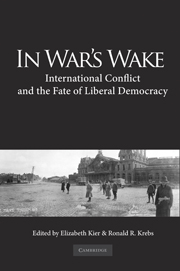Book contents
- Frontmatter
- Contents
- List of Contributors
- Acknowledgments
- 1 Introduction
- PART I WAR AND DEMOCRATIC TRANSITIONS: NEW AND DURABLE DEMOCRACIES?
- PART II WAR AND DEMOCRATIC PUBLICS: RESHAPING POLITICAL PARTICIPATION?
- 5 The Effects of War on Civil Society
- 6 Veterans, Human Rights, and the Transformation of European Democracy
- 7 War and Reform
- 8 Spinning Mars
- PART III WAR AND DEMOCRATIC STATES: GOVERNMENT BY THE PEOPLE OR OVER THE PEOPLE?
- References
- Index
6 - Veterans, Human Rights, and the Transformation of European Democracy
Published online by Cambridge University Press: 05 June 2012
- Frontmatter
- Contents
- List of Contributors
- Acknowledgments
- 1 Introduction
- PART I WAR AND DEMOCRATIC TRANSITIONS: NEW AND DURABLE DEMOCRACIES?
- PART II WAR AND DEMOCRATIC PUBLICS: RESHAPING POLITICAL PARTICIPATION?
- 5 The Effects of War on Civil Society
- 6 Veterans, Human Rights, and the Transformation of European Democracy
- 7 War and Reform
- 8 Spinning Mars
- PART III WAR AND DEMOCRATIC STATES: GOVERNMENT BY THE PEOPLE OR OVER THE PEOPLE?
- References
- Index
Summary
The role of veterans in postwar political life is a subject in need of attention. The primary reason is the tendency of scholars to work from an American or from a German perspective to probe the political outlook and pressure of veterans groups over the last century. In that optic, veterans are overwhelmingly patriotic, conservative, or reactionary. Their experience of war or of preparation for war makes them authoritarian, illiberal, or natural supporters of right-wing or extreme-right-wing political parties and movements.
What happens if we choose a different optic, a French one, and juxtapose it with the conventional view? In some respects, there is evidence of right-wing or extreme-right-wing tendencies among some French veterans, like Jean Marie Le Pen of the Front National, or the interwar Croix de feu, or among the Organisation de l'armée secrète (O.A.S.) assassins who tried and failed several times to kill Charles de Gaulle after his volte face on Algerian independence in 1959. But in other respects, French history provides a long and well-documented alternative narrative that today remains in the shadows. It tells a story of a different kind, that of a mass movement of pacifist veterans, millions of them, who from the 1870s to 1940, saw military service as the shield of the Republic. It arises in the late nineteenth century in the cry of Jean Jaurès for La nouvelle armée. It moves to the left in revulsion over the anti-Republican and Catholic cabal to convict, imprison, and forget Colonel Dreyfus.
- Type
- Chapter
- Information
- In War’s WakeInternational Conflict and the Fate of Liberal Democracy, pp. 121 - 138Publisher: Cambridge University PressPrint publication year: 2010
- 2
- Cited by



